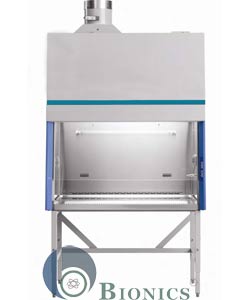Why Biosafety Cabinets is a Trending Topic Now?
Why Biosafety Cabinets is a Trending Topic Now?
Blog Article
Enhancing Laboratory Safety with Class 2 Biosafety Cabinets and Microbiological Protection

Maintaining a safe lab environment is crucial in today’s advanced research and clinical setups. Whether it's handling live pathogens or sensitive diagnostics, biosafety cabinets are central to preventing cross-contamination and safeguarding personnel.
Class 2 Biosafety Cabinets are widely adopted for offering three-way protection. These units are essential for labs working with infectious materials or clinical diagnostics.
Overview of Biosafety Cabinets in Laboratory Environments
Biosafety cabinets are ventilated enclosures built to protect both users and biological materials. They use HEPA filtration to remove contaminants from incoming and outgoing air.
These units are generally classified into three main types: Class I, II, and III based on containment level. Among these, Class II units strike a balance between user, product, and environmental protection.
Why Class II Cabinets Are the Preferred Choice in Labs
Class 2 Biosafety Cabinets ensure safety on all fronts—personnel, workspace, and biological material. They utilise downward laminar airflow within a sealed system.
Air is treated using dual filtration systems to ensure safe circulation and exhaust. These cabinets are ideal for work involving moderate-risk pathogens (BSL-2/3).
Key Features of Microbiological Safety Cabinets
A Class 2 microbiological safety cabinet includes several advanced features such as:
• HEPA/ULPA filtration to trap microbes and particles
• Laminar airflow that minimises disruption and contamination
• Pressure differentials that maintain internal containment
• Optional UV lights for overnight sterilisation
• Noise-reducing construction for better working conditions
• Clear front panel for visibility and safety
These elements ensure safety, comfort, and efficiency in day-to-day lab tasks.
Industries and Labs That Rely on Microbiological Safety Cabinets
Class 2 Biosafety Cabinets are widely deployed in clinical labs, vaccine R&D, and academic research. They are ideal for safe handling of samples during testing and experimentation.
From universities to private pathology labs, Class 2 cabinets ensure lab hygiene and sample integrity.
Benefits of Using Class 2 Biosafety Cabinets
Using Class 2 cabinets offers multiple advantages including operator protection and experimental reliability:
• Protects the integrity of lab work
• Acts as a barrier between user and biohazard
• Improves environmental safety by filtering outgoing air
These Biosafety Cabinets cabinets support biosafety goals while improving lab productivity.
Design and Compliance Standards
Top manufacturers build Class 2 cabinets in accordance with strict international guidelines. Class 2 units are sub-classified as A1, A2, B1, and B2—based on varying airflow balance and ducting needs.
• Type A2: Most commonly used cabinet model
• Type B2: Suited for labs dealing with toxic agents
Selecting the right configuration ensures compliance and safety.
How to Select a Class 2 Safety Cabinet
Before purchasing, consider:
• The biosafety level required (BSL-1, BSL-2, or BSL-3)
• Ventilation compatibility and placement
• Energy consumption and maintenance frequency
• Service network and part availability
Consulting with experts ensures the cabinet fits both budget and compliance goals.
Installation and Safety Guidelines
For optimal results:
• Install the cabinet in a draft-free, low-traffic zone
• Get periodic validation from certified technicians
• Train users in proper techniques and precautions
Operational best practices include:
• Always wear appropriate lab PPE
• Avoid sudden or quick arm movements
• Clean all contact points post-operation
• Treat UV usage as an overnight sterilisation method
Final Thoughts on Class 2 Biosafety Cabinets
Class 2 biosafety cabinets are vital equipment in laboratories dealing with biohazards. They protect workers, secure samples, and copyright environmental standards.
From biotech and diagnostics to academia and pharma, Class II cabinets copyright the highest biosafety levels. When investing in a biosafety cabinet, choose performance and reliability over cost-cutting—because lab safety is non-negotiable. Report this page